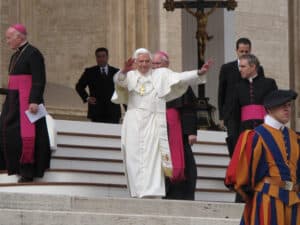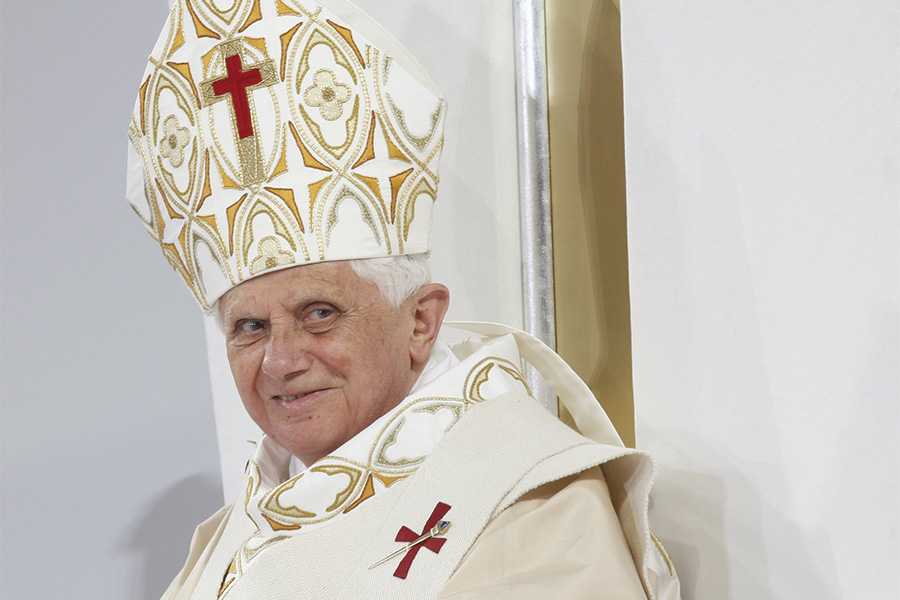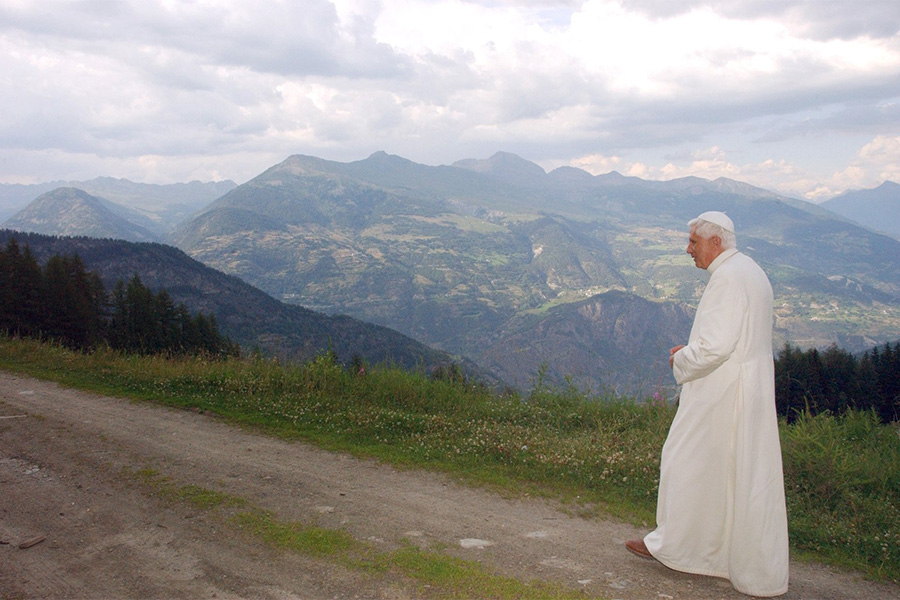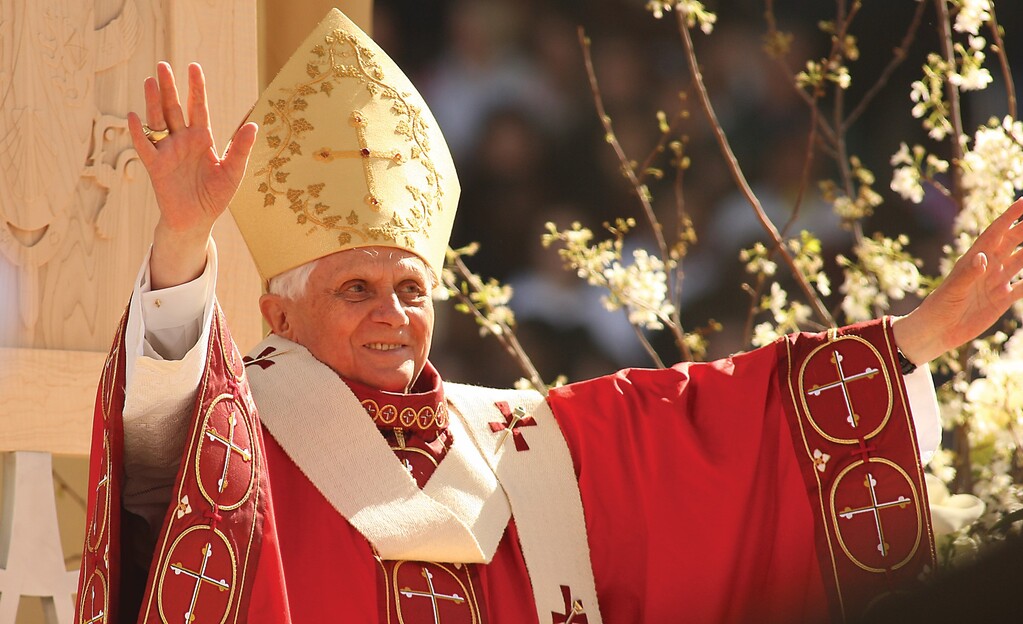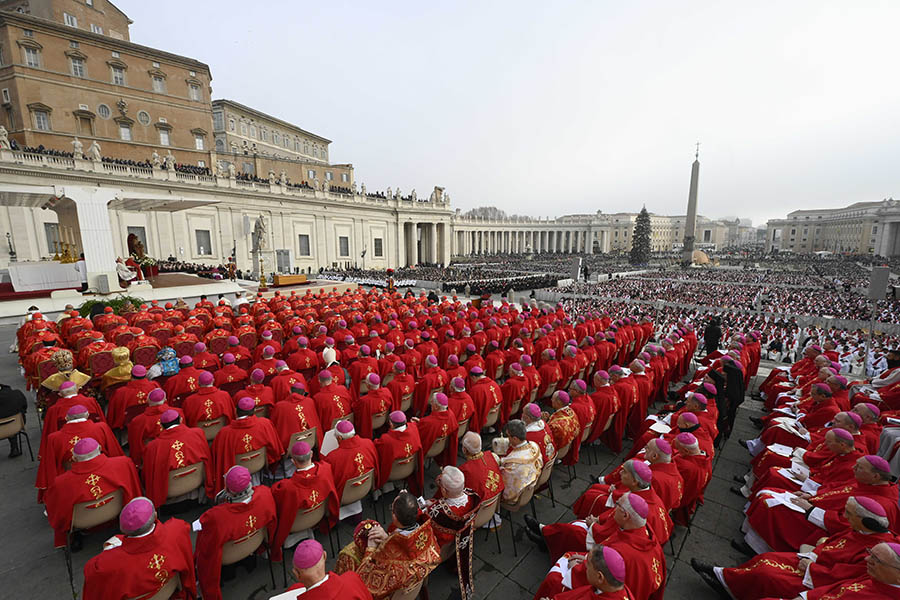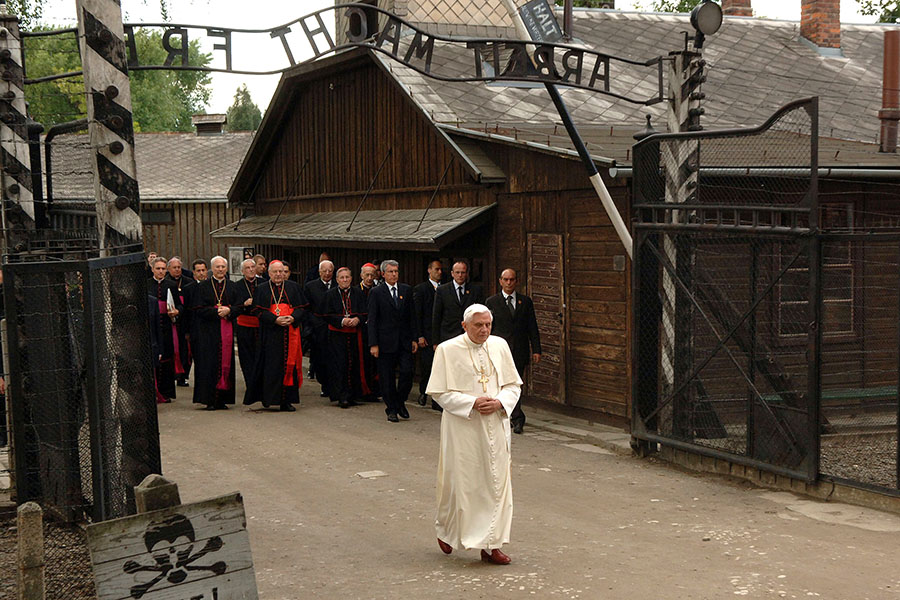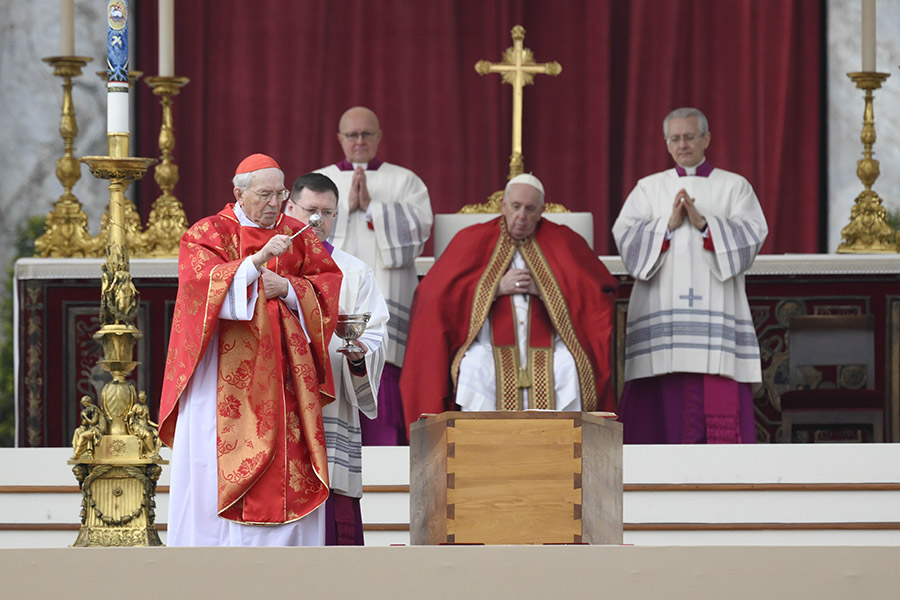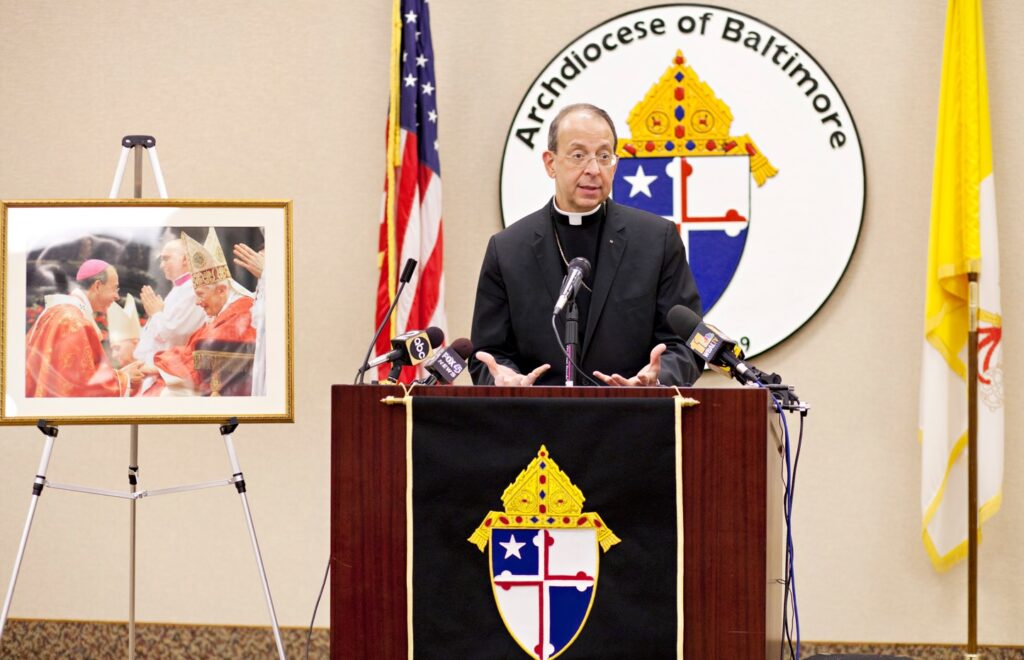
The last three archbishops of Baltimore have all had connections to Pope Benedict XVI, who died Dec. 31.
In 2013, Archbishop William E. Lori told the Catholic Review a story about a bumpy flight he shared between Philadelphia and Washington, D.C., with then-Cardinal Joseph Ratzinger that provided a glimpse into the future pope’s personality.
“It was stormy outside,” remembered Archbishop Lori, then the priest-secretary to Washington Cardinal James Hickey. “It was a small plane that didn’t go to a higher altitude and we were kind of getting shaken up on this flight pretty good.”
To make matters worse, the German cardinal – in the United States to give addresses at St. Charles Borromeo Seminary in Philadelphia and the Dominican House of Studies in Washington – was suffering from a flu-like illness.
“As bad as he felt, he had people in that plane who were asking him questions the whole flight,” Archbishop Lori said. “I remember how patiently he answered our questions and how kind he was to all of us.”
During his visit, Cardinal Ratzinger patiently endured two dinners and delivered what Archbishop Lori remembered to be “top-notch” lectures.
As Cardinal Hickey and Archbishop Lori bade farewell to the then-prefect of the Congregation for the Doctrine of Faith, they marveled at his generosity and his humility.
“What a good man,” Archbishop Lori said at the time.
“Here’s a man who speaks many languages, who knows not only theology in great, great depth, but who also knows literature and music and is so cultured,” Archbishop Lori said in 2013 after Benedict stepped down as pope, “but he never imposes his learning. He shares it as a gift and it is received as a gift.”
While he never visited Baltimore, the late Pope Benedict XVI was well aware of the city’s place in the history of Catholicism in the United States.
When he met with officials from archdiocese in the region in 2012, Pope Benedict made note of the significance of Baltimore’s status as the first diocese in the United States
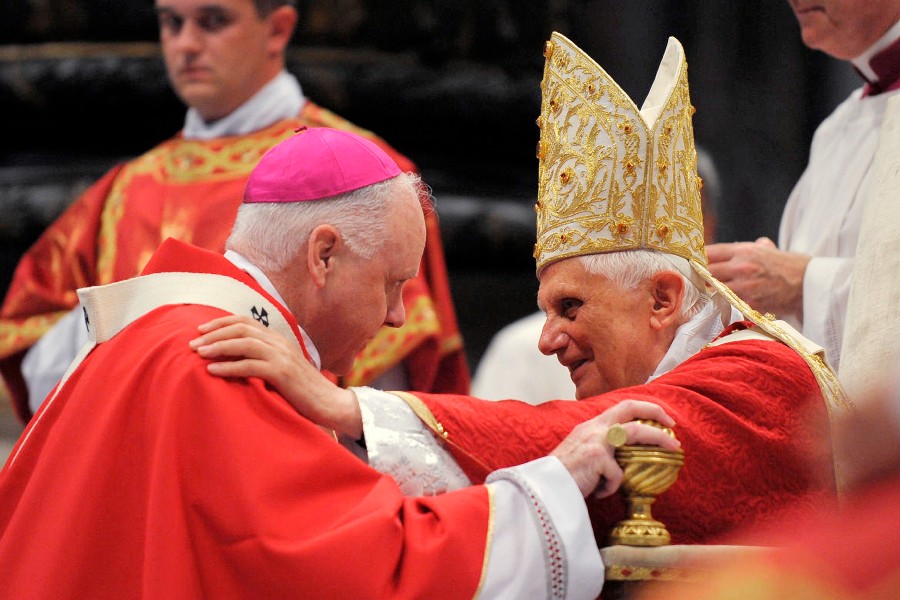
Cardinal Edwin F. O’Brien, when he was apostolic administrator of the Archdiocese of Baltimore, discussed the state of the Baltimore archdiocese with Pope Benedict XVI and Vatican officials during a series of meetings in Rome.
“He’s such an easygoing man,” Cardinal O’Brien said in 2012, “and he’s truly interested in the church in our country and in each of our dioceses.”
The discussions were part of an “ad limina apostolorum” visit to the Vatican, usually held every five years. The name comes from the Latin for “to the thresholds of the apostles.”
The bishops of Maryland, Delaware, Virginia, West Virginia, the U.S. Archdiocese of Military Services, the District of Columbia and the Virgin Islands participated in the gathering.
“He was very well aware that Baltimore was the birthplace of Catholic education (in the United States),” Cardinal O’Brien said in 2012. “He acknowledged the struggles, but he encouraged us to stay strong because it has meant such a great deal to our country.”
In a move to strengthen Catholic education in Maryland, the Baltimore archdiocese consolidated 13 Catholic schools in 2010 and introduced new educational programs. Cardinal O’Brien said at the time the pope was “very reassuring.”
Cardinal O’Brien noted that the pope was aware of specific challenges faced in the various dioceses.
Among the Vatican congregations the Baltimore delegation visited included the Congregation of Bishops and the Congregation for the Doctrine of the Faith. Auxiliary Bishops Mitchell T. Rozanski (now archbishop of St. Louis, Mo.) and Denis J. Madden participated in the ad limina visit.
“We had a good discussion on evangelization,” Cardinal O’Brien said, “and there was a great deal of enthusiasm for the pope’s letter on the door of faith.”
Cardinal O’Brien was present Feb. 11, 2013 when Pope Benedict, speaking in Latin, told cardinals living in Rome that, after much prayer, he believed his age and diminishing energy meant he should retire for the good of the church.
“I didn’t believe it. I didn’t want to believe it,” Cardinal O’Brien told Catholic News Service.
The cardinal said his Latin is “not good,” but, “I saw the reaction on peoples’ faces and I caught a few key words.”
In 2013 after Pope Benedict stepped aside in his role leading the Catholic Church at age 85, Archbishop Lori reflected on his legacy.
Pope Benedict “exercised his papacy to ensure that the church in the future would be dedicated to a fresh, vigorous, confident proclamation of the faith,” Archbishop Lori said at the time.
The pope sought to reach not only those who hadn’t heard the Gospel, Archbishop Lori said, but also those whose faith and devotion had cooled.
“His Holiness is a profound and loving teacher of the faith, a courageous defender of human rights and dignity, and a man of prayer, humility and wisdom,” Archbishop Lori said in 2013.
Archbishop Lori emphasized the pope’s humility in stepping down, noting that it takes a “marvelous, holy and strong person,” to make that decision. “(Pope Benedict) is a gentle, almost courtly man,” Archbishop Lori said. “(He’s) very gracious, with a ready smile and a good sense of humor.
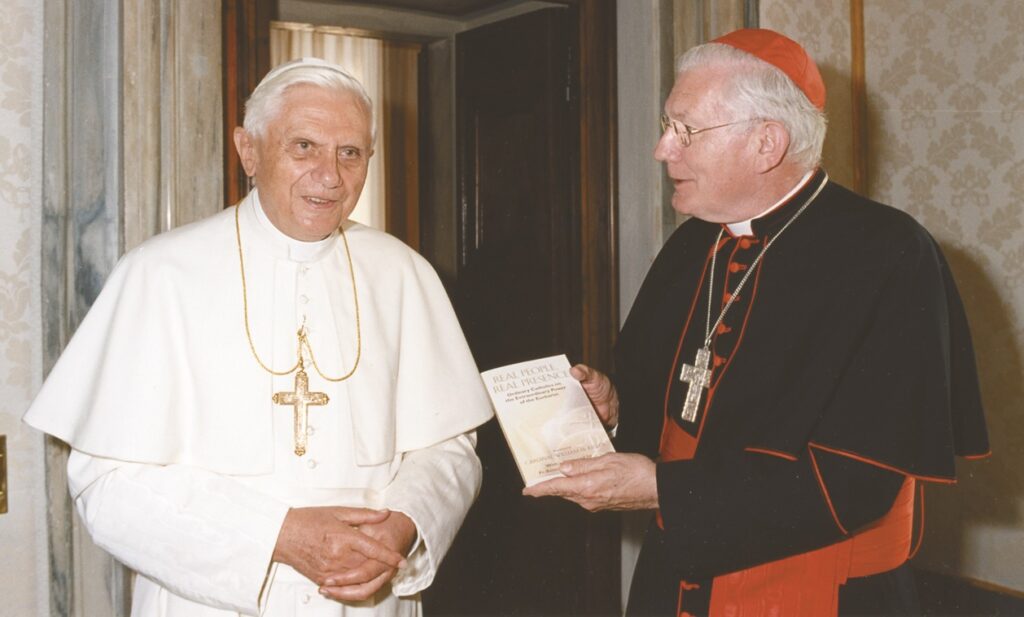
The archbishop reflected on the copious writings of the pope, noting that “the person of Christ” shines through in everything the pope has written.“He has a way of writing and reflecting about Christ – whether it’s officially or unofficially – that plucks Christ out of the pages of history and brings him into the present – and in a way that is real and palpable and made to address the issues of our day,” Archbishop Lori said.
The pope’s writings transcend being liberal or conservative, the archbishop said. “I think the word that comes to mind is profound – profoundly true,” he said.
Baltimore Cardinal William H. Keeler, who was part of the 2005 conclave that resulted in the election of Pope Benedict XVI, said in a 2005 interview with the Catholic Review that he always found the former Cardinal Ratzinger “very friendly, very supportive and very helpful.”
“I say that he reminds me of my mother: he is sweet and clear,” Cardinal Keeler said.
The cardinal added that he found Pope Benedict “to be open to free discussion in his presence.”
“He is one who knows what the Catholic faith and its tradition are – and he’s able to articulate it with precision,” Cardinal Keeler said.
Gerry Jackson and George Matysek Jr. contributed to this story.
Also see
Copyright © 2022 Catholic Review Media
